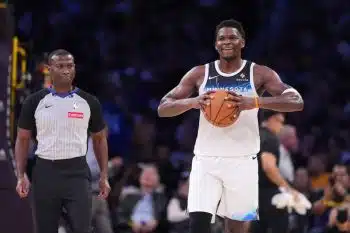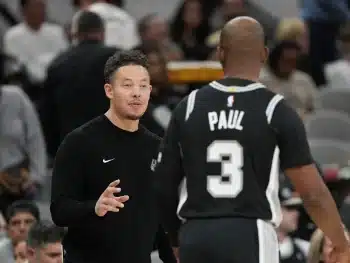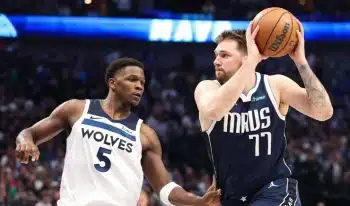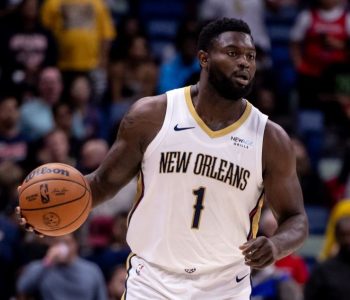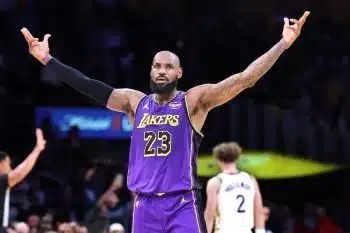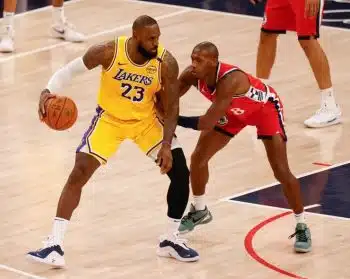NBA
NBA Daily: Alec Burks’ Return a Perfectly Timed Boost for the Knicks
The New York Knicks are currently on their longest winning streak since 2014. Along the way, they’ve defeated several teams with whom they’re competing for a playoff spot – and unbelievably, home-court advantage in the first round – including the Atlanta Hawks and the Charlotte Hornets.
While the Knicks still have the sixth-hardest remaining schedule, they also own the fourth-best record in the Eastern Conference – and they’ve been far more successful than anyone expected. And Alec Burks has a lot to do with that.
Burks is a relatively big and versatile guard. At 6-foot-6, Burks can guard at least three positions on the floor. He’s a good on-ball defender who gives good effort. Burks isn’t an ideal system defender, but no one signs Burks for his defense.
Offensively, Burks is a difference-maker. He’s had a number of clutch performances with the Knicks this season, as well as in previous seasons with the Utah Jazz and Philadelphia 76ers. He’s also performed well for the Cleveland Cavaliers and Golden State Warriors.
Burks is regarded as a journeyman, but don’t mistake the fact that he’s played for multiple teams to mean that he isn’t a major contributor.
Burks is a right-handed player, but he scores it from both sides of the court. He is comfortable in the midrange, gets to and finishes at the hoop and shoots it efficiently from deep. He can also initiate the offense and play off the ball in a catch-and-shoot capacity. Ultimately, he’s versatile and he can power an offense for a time – a helpful attribute to a team in need of additional offensive firepower.
Burks joined the Knicks, presumably taking Wayne Ellington’s role. Through 44 games in 2020-21, he is averaging 12.6 points, 4.5 rebounds and 2.2 assists in 25.8 minutes per game through 44 games. But that only tells part of the story.
Burks has scored 20 or more points 10 times this season. He’s shooting 40.8% on three-point attempts and 86.5% from the free-throw line. And remember, there was a 10-game stretch when Derrick Rose was out with COVID-19, during which time Burks played an even bigger role than normal, helping to keep the Knicks afloat. In those 10 games, Burks played 28.2 minutes per game, up from 25 minutes in all other games this season — the Knicks still went 5-5.
Burks signed a team-friendly, one year/$6 million deal last Fall. He might have earned himself an even bigger contract with his play this season. But his next contract will probably be influenced by his ability to return to form this season.
But next season is still a ways off, with Burks’ immediate future unclear. He missed his fourth straight game on Wednesday night due to health and safety protocols and, while COVID-19 is mostly a short-term inconvenience for NBA players, there isn’t much of a long-term left to consider this season; the regular season concludes in less than a month.
The Knicks organization has not commented on how Burks is doing or when he’s expected back. If he’s lucky, he’s experienced light to no symptoms, meaning there’s a chance that he hits the ground running upon his return. Alternatively, a more severe case and lingering effects are bad news for Burks and the Knicks.
The Boston Celtics’ Jayson Tatum contracted COVID-19 and is still dealing with long-term symptoms. Tatum was averaging 26.9 points per game on 47.4%/43.8%/88.9% shooting before his infection. After a 10-day absence, Tatum is averaging 25.2 points per game on 44.8%/36.7%/87.6% — not too severe a drop off, but enough to impact results.
And that’s only averages. Players can push through discomfort and put up numbers that resemble those of a healthy version of themself, but the cumulative effects of playing after COVID-19 can lead to additional complications. Tatum has been vocal about his lingering symptoms and he recently spoke out about his need for an inhaler before games – a first for him in his athletic career.
Yes, it can be relatively simple for teams to maneuver around such a situation in the regular season. But in the playoffs, one loss is significantly more meaningful, while resting a player for part of or for an entire game is restrictive to the team’s ability to manage their shorter rotations. Further, the play-in tournament leaves absolutely no room to do so – and the Knicks (and Celtics) could easily find themselves in play-in games – in which case, New York will hope to get Burks back to 100 percent sooner than later.
Context is everything and not knowing the specifics around Burks’ situation makes it impossible to gauge expectations. But while New York has surged in his absence, winning eight-in-a-row, make no mistake about it, the Knicks need Burks – and they need him healthy.
The Knicks are just 23-21 with Burks in the lineup – and 10-6 without him. For those unwilling to break out a calculator, the team has a better winning percentage without Burks.
But the Knicks are also 5-3 when Burks plays 30 or more minutes. And while that’s a relatively small sample size, it equals the same winning percentage as that’s been achieved without him.
But despite the unclear results, you should know that Burks is a necessity. Don’t believe me? It can be summarized in three key statistics: the Knicks commit fewer turnovers (12.9 turnovers vs. 14.5 per 100 possessions), score more points (113.1 points vs. 110.5 per 100 possessions) and allow fewer points (107 points vs. 110.8 per 100 possessions) when Burks is on the floor.
The Knicks have maximized their talent, winning more than anyone expected. It wouldn’t be terribly surprising if they overachieved again, without Burks, down the stretch of the season.
But they would obviously prefer for him to return to the rotation – and do so as a fully healthy and operational version of himself. If he can and if the Knicks can maintain their strong play, New York could be even more dangerous than we think they are come the postseason.
